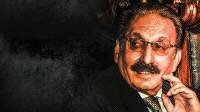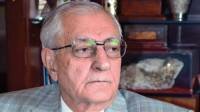Pervez Musharraf is as yet unable to reconcile himself with the fact that he is no longer the president and chief of the country’s army.
Musharraf’s farmhouse, often described as a luxurious Mediterranean-style villa on the outskirts of Islamabad, is not far from the main road in a neighbourhood known as Chak Shahzad. But a narrow, connecting road is now closed to the general public. Concrete barriers and barbed wire block the way. Police officers – automatic rifles slung over their shoulders – stand guard.
To reach the main entrance, visitors have to take another, longer route, which passes through a neighbourhood of rundown middle-class houses and a graveyard. Of the three security barriers, the first is manned by private security guards; the other two by police officers. They communicate through walkie-talkies, check vehicle registration numbers, verify photo IDs and wait for further instructions from inside the farmhouse.
The main entrance has a massive gate that is only opened for the rarest of visitors. Guards peer through small windows before opening the smaller side gate,after which visitors have to go through yet another rigorous security check. Once clearing the hurdle, a security guard holding a walkie-talkie, leads a visitor to a small waiting room.
The room has a two-seater sofa, a pair of chairs and a bed. A picture of a uniformed General Musharraf, with a serious look on his face, is hung on the main wall. On the adjacent wall hangs a painting of Baloch warrior tribesmen, presented to the householder by the colonel commandant of the Baloch Regiment of the Pakistani Army in 2003. Paint is peeling from one wall.
The farmhouse is spread over five acres. It has four bedrooms and the exterior, with a rooftop of green gable tiles, is somewhat lacking in finesse. The landscaping of the garden was done by Musharraf’s daughter. Rangers stand in different corners, closely monitoring the movements of visitors and staff alike.
“I would say it is a little better than average house,” Musharraf said on a recent afternoon, during an interaction with a select group of journalists. He said his farmhouse was rather modest, compared with some other farmhouses in his neighbourhood.
He is right. The farmhouse is far from imposing, and lacks any extravagant exhibitions of opulence. The reception area walls are filled with an impressive collection of swords. Paintings, army memorabilia adorn the walls and sideboards. Were it not for the extreme sense of security and precaution, the house can be taken as an archetypal general’s house. The distinguishing feature is that the residence is run like a former president’s. An usher opened the door before Musharraf walked in and announced, “Mr. President!”
General Musharraf walked in quickly, beaming with confidence and his usual swagger. He was wearing a sky blue shirt, dark blue tie and dark grey suit. His hair seemed to have a fresh dye. And, for a man embattled in a phalanx of court cases – the worse being the treason prosecution – Musharraf looked as though he was in rather good spirits.
During the interview, Musharraf said he was still deliberating with his lawyers over whether to appear before the special court panel. A personal appearance would mean an indictment, and could further ensnare him the legal quicksand.An earlier hearing of the trial was adjourned after explosives and three pistols were found abandoned, 500 yards from the farmhouse.
Musharraf’s lawyers had, therefore, impressed upon the presiding judge that the dangers to the former army chief’s life remained grave, and so he should be exempted from a court appearance. The justice declined the exemption but adjourned the hearing until the new year.
In early January, Islamabad police found more explosives on the route Musharraf was to take for the court appearance. This time, explosives were strapped to a streetlight. While the former army chief has no dearth of enemies, the sudden discoveries of explosives raised many eyebrows, with some people insinuating that it could be a ruse to earn him an exemption from personal court appearances.
Musharraf terms the treason trial the worst kind of “political vendetta”, a process set in motion by his political nemesis Nawaz Sharif, the prime minister, and Iftikhar Muhammad Chaudhry, the former chief justice who retired in December.
In several interviews over the weekend – a media blitzkrieg to influence public opinion – Musharrafhinted that there is trepidation and unease in the 500,000-strong army. He says that the troops are upset over the way their former chief is being treated.
However, there has been no official reaction from the military. Another former army chief, General Ashfaq Pervez Kayani, had distanced the military from overt public influence and maintained a public silence over the issue of Musharraf. The new army chief, General Raheel Sharif, is even more reluctant to engage with the media.
Gen. Musharraf’s insistence that the army is unhappy over his fate might be seen as clutching at straws. The fact cannot be discounted that, within the rank and file of the military, there is certainly unease over how Musharraf has been dragged through the courts. Musharraf, used to years of unadulterated power and obsequious behaviour by his underlings and former political allies, seemed himself pained by the fact that he had to appear before a judge when he first landed back in Pakistan. Dealing with how his fate had turned upside down – making him fall from the apex of power and fame to the nadir of ignominy and political irrelevance – could not have been easy.
It was this particular sense of delusion, the powerful intoxication of a Messiah complex, which led Musharraf to return to Pakistan, spurning all advice that suggested otherwise. Musharraf brushed off criticism, boasting in his usual style that he would be welcomed by throngs of people, who were already disillusioned and dismayed by the rampant corruption and mismanagement of civilian politicians.
A close aide of Musharraf said that during his days in exile in London and Dubai, the former ruler, in a state of inebriation, used to phone people telling them it was “the president”ordering them on matters related to government policymaking and transfers of civilian and military bureaucracy.
Musharraf got his first shock when he landed at Karachi airport on 24 March 2013 and found only a smattering of what he thought would be an ocean of adoring crowds. But much like his thin political support, Musharraf also has critics from his former institution.
A joint statement issued by President Pakistan Ex-Servicemen Society (PESS) Lieutenant General Hamid Gul, and President Pakistan Ex-Servicemen Association Lieutenant General Ali Kuli Khan (both retired) stated that the army had nothing to do with the imposition of emergency rule in 2007 – the main charge against Musharraf in the treason trial.
“The best course for him would be to follow the law and let judiciary decide the case on merit,” the statement signed by several former army generals advised Musharraf.
Following this advice is most perilous, as it is fraught with the danger of a conviction. It was, therefore, no surprise that Musharraf decided to challenge the legality of the treason case.
The treason trial has now polarised the country. It is seen by many as a drive by the government of Sharif to extract revenge from Musharraf through the judiciary. The hatred of the judges towards Musharraf is an open secret, and the manner in which the trial has proceeded has also raised questions about transparency. Critics point out that if Musharraf had to be tried, he should have been made answerable for the ‘original sin’: the 1999 military coup. The pro-government camp rubbishes such assertions by stressing that this argument is nothing but a desperate strategy by Musharraf and his sympathisers to escape conviction.
The sudden hospitalisation of Musharraf at Armed Forces Institute Cardiology on 2 January added a new twist to the saga. There were insinuations that the military moved in to protect its former chief from what was an inevitable indictment had Musharraf appeared in court. Gradually, Musharraf’s old allies – the Chaudhrys of Gujrat, Altaf Hussain of MQM et al – also broke their silence, voicing support for their former boss.
Meanwhile, the rumour mill started churning out speculations that a deal was underway – brokered by the Saudis and UAE royals – that would see Musharraf whisked away to a foreign country, ostensibly for medical treatment. Musharraf leaving for exile once again has been portrayed as a win-win situation for the military, the judiciary and the political government. According to a medical report submitted on 24 January, Musharraf expressed his desire to be treated abroad for his heart condition.
The key to the Musharraf imbroglio is now in the hands of the courts. One thing is clear. Musharraf has paid dearly for his delusions of grandeur and repeated political miscalculations. He would be extremely lucky if he manages find refuge in exile once again.























